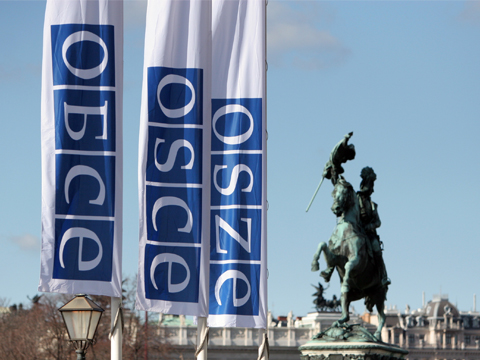OSCE MG urges parties to Nagorno-Karabakh conflict to observe ceasefire

By Nazrin Gadimova
The aggravation of the situation in Azerbaijan’s occupied Nagorno-Karabakh region has demanded an immediate reaction from the OSCE Minsk Group, which has not managed to resolve the conflict over the entire period of its existence.
The OSCE Minsk Group co-chairs have decided to hold a meeting in Vienna on April 5 following the news on escalation of the Armenian-Azerbaijani conflict.
The co-chairs, after the Vienna talks, urged the parties to the Nagorno-Karabakh conflict to stop the use of force immediately.
“We strongly condemn the outbreak of unprecedented violence along the line of contact. We extend our condolences to all affected families. We urge the sides to cease using force immediately,” the statement read, once again emphasizing that the co-chairs see no military solution to the conflict.
The member states believe that the deterioration of the situation demonstrates the need for an immediate negotiation under the auspices of the co-chairs on a comprehensive settlement.
Representatives of the OSCE Minsk Group countries -- Russian Federation, the United States of America, France, Belarus, Finland, Germany, Italy, Sweden, Turkey, as well as the incoming Austrian OSCE Chair and the Serbian OSCE Chair affirmed their support for the mediation efforts of the Russian, American, and French co-chairs and welcomed their plans to undertake direct consultations with the sides as soon as possible.
Actually, the OSCE MG co-chairs have not made any new statement that could play a decisive role in the settlement of the conflict.
The OSCE Minsk Group acted as the only mediator in resolution of the conflict, proceeding talks based on the renewed Madrid principles. The statements promising a sincere contribution to the peaceful resolution of the conflict have become frequent, but declarative in essence.
The very attitude, unfortunately, ruined confidence in success of the mediators representing the U.S., Russia and France.
The group's activities were subjected to criticism many times and Azerbaijan’s ministers have numerously stated the government's dissatisfaction with the work for pushing the conflict from the dead point.
President Recep Tayyip Erdogan has also blamed the "inability"
of an international mediation group to find a peaceful solution to
the Nagorno-Karabakh conflict for recent deadly clashes between
Azerbaijan and Armenia.
"If the Minsk Group had taken fair and decisive steps over this, we
wouldn't have seen this incident happening right now," Erdogan said
commenting on the clashes.
The Minsk Group could not arrange for a meaningful pathway forward to end the conflict and start moving toward the end of the occupation.
Armenia and Azerbaijan fought a lengthy war that ended with the signing of a fragile ceasefire in 1994. More than 20,000 Azerbaijanis were killed and over 1 million were displaced as a result of the large-scale hostilities. Since the war, Armenian armed forces have occupied 20 percent of Azerbaijan's territory, including Nagorno-Karabakh and seven surrounding regions.
--
Nazrin Gadimova is AzerNews’ staff journalist, follow her on Twitter: @NazrinGadimova
Follow us on Twitter @AzerNewsAz
Here we are to serve you with news right now. It does not cost much, but worth your attention.
Choose to support open, independent, quality journalism and subscribe on a monthly basis.
By subscribing to our online newspaper, you can have full digital access to all news, analysis, and much more.
You can also follow AzerNEWS on Twitter @AzerNewsAz or Facebook @AzerNewsNewspaper
Thank you!
